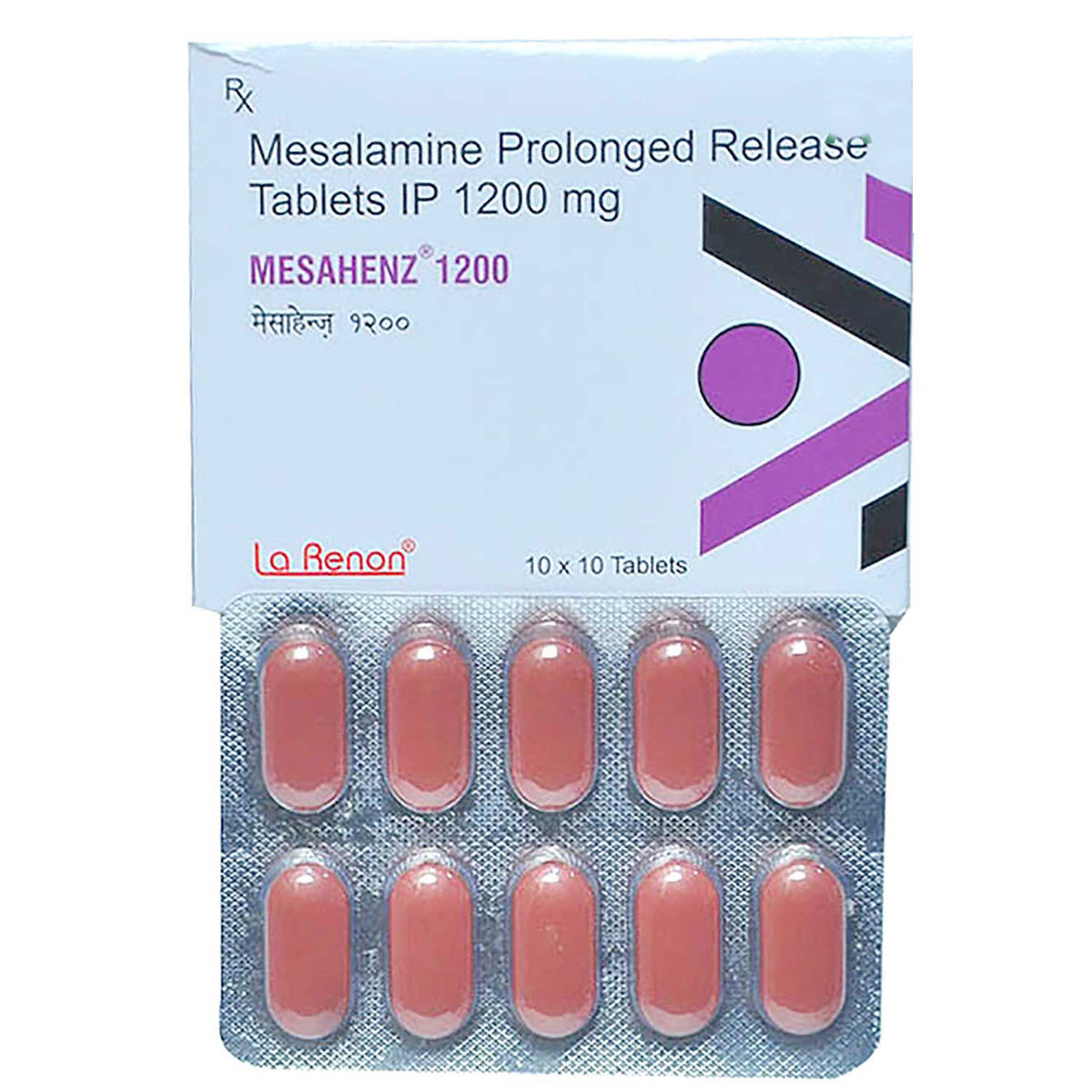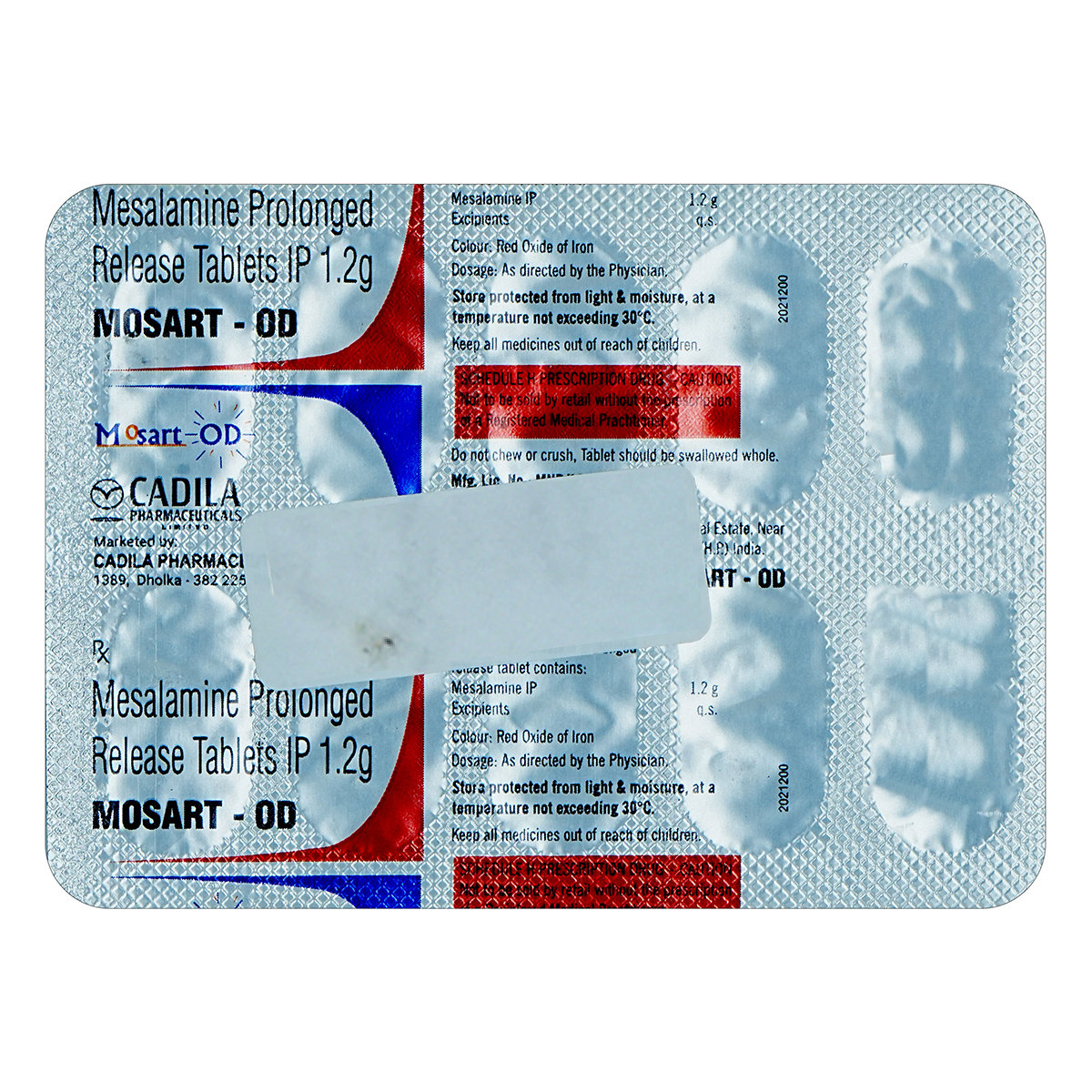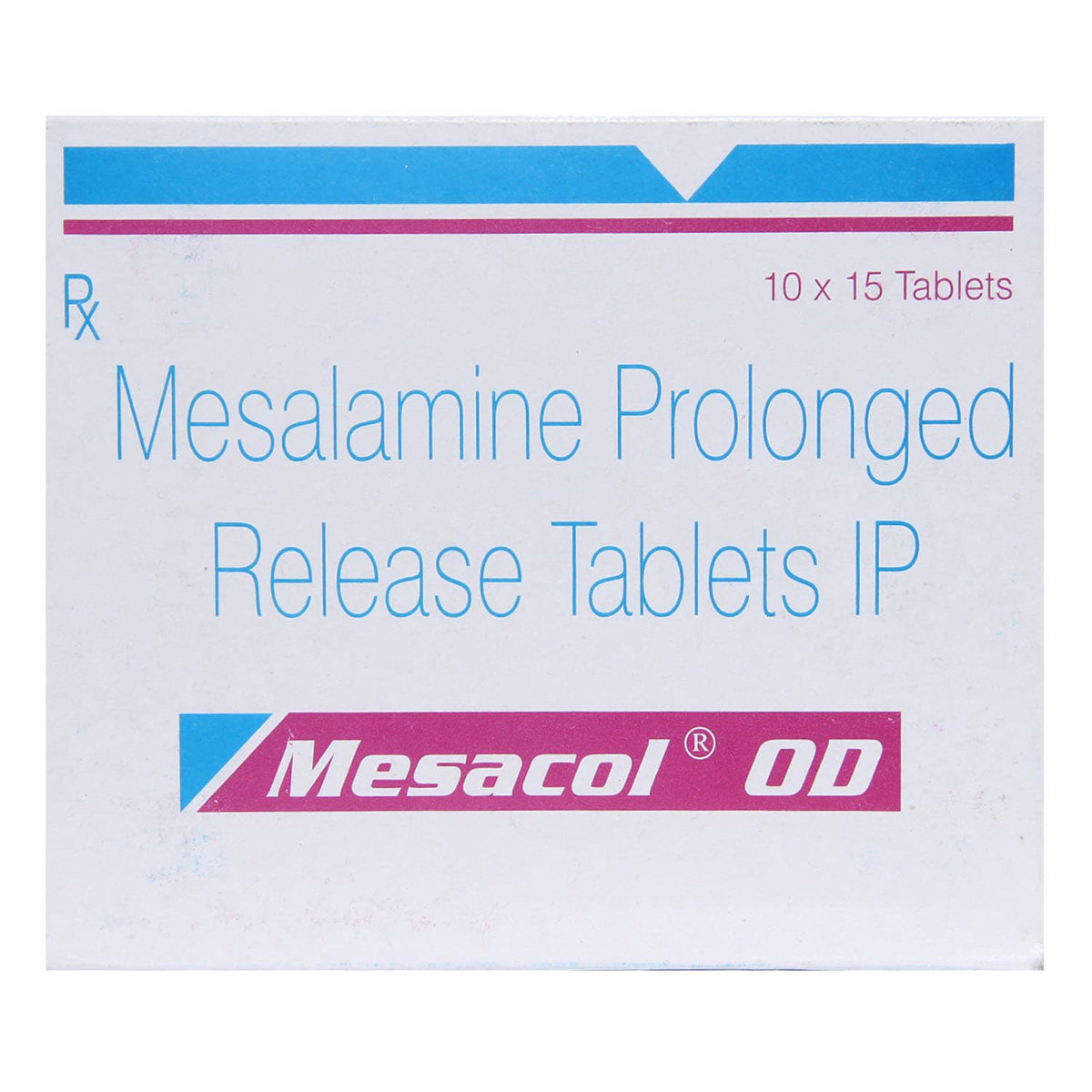- Home
- Bravasa 1.2Gm Tab
Bravasa 1.2Gm Tab Substitute
Bravasa 1.2Gm Tab Substitute
Medicine Composition:
MESALAMINE-1200MGAll Substitutes & Brand Comparisons
RX
Out of StockMesavin-1200 mg SR Tablet 10's
Alniche Life Sciences Pvt Ltd
₹214
(₹19.26 per unit)
13% CHEAPERRX
Mesahenz 1200 Tablet 10's
La Renon Healthcare Pvt Ltd
₹258.5
(₹23.27 per unit)
4% COSTLIERRX
Out of StockMesatis-OD Tablet 10's
Tesla Labs
₹288
(₹28.8 per unit)
29% COSTLIERRX
Mosart-OD Tablet 10's
Cadila Pharmaceuticals Ltd
₹323
(₹29.07 per unit)
30% COSTLIERRX
Mesacol OD Tablet 15's
Sun Pharmaceutical Industries Ltd
₹541.5
(₹32.49 per unit)
46% COSTLIERRX
Out of StockColoncop 1200 Tablet 15's
Mankind Pharma Pvt Ltd
₹492
(₹32.8 per unit)
47% COSTLIERRX
Mesanil-1200 Tablet 10's
Sanatra Healthcare Ltd
₹373
(₹33.57 per unit)
51% COSTLIERRX
Out of StockUcgut-OD Tablet 10's
Manith Healthcare Pvt Ltd
₹340
(₹34.0 per unit)
52% COSTLIER

When Should You Consider Switching from Bravasa 1.2Gm Tab ?
Patients may explore substitutes in the following scenarios:
- High monthly cost of Bravasa 1.2Gm Tab
- Non-availability in local pharmacies
- Generic recommendation by a doctor
- Side effects or better tolerability with alternatives
What to Know Before Switching
Before you switch from Bravasa 1.2Gm Tab to another medicine, here are some important points to keep in mind:
Same salt, different brands:
Most substitutes contain the same active ingredient - MESALAMINE-1200MG, but the fillers, coating, or manufacturing quality may vary slightly.
Consult your doctor first:
Even if the salt is the same, your doctor can confirm if the substitute is right for your condition, dosage, and health history.
Watch out for allergies or reactions:
Some people may react differently to certain brands due to inactive ingredients. If you notice any side effects, inform your doctor immediately.
Price ≠ effectiveness:
A lower-priced substitute doesn't mean it's less effective. Many generic medicines work just as well as branded ones.
Check the dosage form and strength:
Always match the substitute’s strength (e.g., 5mg, 10mg) and form (tablet, capsule, syrup) with what your doctor prescribed.
Uses
Medicinal Benefits
Bravasa 1.2Gm Tab contains Mesalamine, an anti-inflammatory drug used to treat ulcerative colitis and Crohn’s disease. It works by inhibiting the production of certain chemical substances, such as prostaglandins, that cause pain and swelling. Thereby helping reduce inflammation (redness and swelling) in the intestines and providing relief from symptoms such as stomach pain or bleeding. Also, Bravasa 1.2Gm Tab may prevent further episodes of ulcerative colitis.
FAQs
The substitutes of Bravasa 1.2Gm Tab contain the same active salt(s) - MESALAMINE-1200MG. However, they may differ in price, manufacturing quality, and inactive ingredients. Speak to your doctor to find a suitable option.
Switching to a generic substitute medicine in the place of Bravasa 1.2Gm Tab is often possible if it has the same salt, strength, and dosage form. But always check with your doctor before making any changes to your medication.
Generics versions of Bravasa 1.2Gm Tab are typically more affordable because they don’t include the original brand's research, development, and marketing costs. They contain the same active ingredient and are approved for safety and effectiveness.
Most people don’t notice any difference. However, some may react to different fillers or coatings. If you notice any unusual symptoms after switching, consult your doctor.
Make sure the new medicine has the same active salt, strength, dosage form. Always confirm the change with your doctor or pharmacist.
Substitutes of Bravasa 1.2Gm Tab meet the same safety and efficacy standards as Bravasa 1.2Gm Tab , but small differences in absorption or formulation can exist. A doctor can help you choose the right one for your needs.
Yes. Substitutes of Bravasa 1.2Gm Tab may vary in color, size, or shape due to differences in manufacturing and branding, but this does not affect how they work.
Yes, it’s generally safe to switch between multiple substitutes of Bravasa 1.2Gm Tab if they have the same salt and strength. However, always inform your doctor so they can monitor how your body responds.
Yes, many people safely use substitutes of Bravasa 1.2Gm Tab for long-term treatment. Just ensure it’s done under medical supervision.
If your symptoms stay under control or lab results remain stable, the substitute for Bravasa 1.2Gm Tab is likely working well. Regular follow-ups with your doctor are important.
Absolutely. Even with the same salt, small differences can affect how your body responds when switching from Bravasa 1.2Gm Tab to its substitute. Always consult your doctor before switching.
Bravasa 1.2Gm Tab contains Mesalamine, which works by inhibiting the production of certain chemical substances, such as prostaglandins, that cause pain and swelling. Thus, it helps reduce inflammation (swelling) in the intestines and relieves stomach pain or bleeding symptoms.
Yes, Bravasa 1.2Gm Tab may cause diarrhoea as a common side effect. However, if the condition persists and worsens with fever, watery stools, or consistent stomach pain, please consult a doctor. Also, drink plenty of water while taking Bravasa 1.2Gm Tab to prevent dehydration.
You are not recommended to take Bravasa 1.2Gm Tab with Ibuprofen as co-administration of these two medicines may increase the risk of kidney problems. However, please consult your doctor before taking Bravasa 1.2Gm Tab with other medicines.
Yes, Bravasa 1.2Gm Tab may cause kidney stones in some patients. It is not necessary for everyone taking Bravasa 1.2Gm Tab to experience this side effect. However, if you notice blood in urine or pain in the sides of the stomach, please consult a doctor immediately. Drink adequate water while taking Bravasa 1.2Gm Tab to prevent kidney stones.
Bravasa 1.2Gm Tab should be used with caution in patients with stomach ulcers as it may increase the risk of worsening the condition. Therefore, please inform your doctor if you have a stomach ulcer before taking Bravasa 1.2Gm Tab .
Some people may develop lactose intolerance (inability to digest lactose) when affected by Crohn’s disease. Therefore, it is recommended to avoid dairy products if you have Crohn’s disease as it may lead to adverse effects such as diarrhoea, stomach cramps, or stomach upset.
Buy best Gastro Enterology products by
Abbott India Ltd
Sun Pharmaceutical Industries Ltd
Alkem Laboratories Ltd
Cipla Ltd
Torrent Pharmaceuticals Ltd
Intas Pharmaceuticals Ltd
Mankind Pharma Pvt Ltd
Lupin Ltd
Dr Reddy's Laboratories Ltd
Aristo Pharmaceuticals Pvt Ltd
Alembic Pharmaceuticals Ltd
Wallace Pharmaceuticals Pvt Ltd
La Renon Healthcare Pvt Ltd
Leeford Healthcare Ltd
Macleods Pharmaceuticals Ltd
J B Chemicals & Pharmaceuticals Ltd
Zydus Healthcare Ltd
Micro Labs Ltd
Zydus Cadila
Fourrts India Laboratories Pvt Ltd
Morepen Laboratories Ltd
Zuventus Healthcare Ltd
FDC Ltd
Eris Life Sciences Ltd
Cadila Pharmaceuticals Ltd
Medishri Healthcare Pvt Ltd
Alniche Life Sciences Pvt Ltd
Medley Pharmaceuticals Ltd
Tas Med India Pvt Ltd
Signova Pharma
Tablets India Ltd
Elder Pharmaceuticals Ltd
Wockhardt Ltd
Emcure Pharmaceuticals Ltd
Sanatra Healthcare Ltd
Glenmark Pharmaceuticals Ltd
Blue Cross Laboratories Pvt Ltd
East West Pharma India Pvt Ltd
Hetero Drugs Ltd
Indoco Remedies Ltd
Vasu Organics Pvt Ltd
Biological E Ltd
Primus Remedies Pvt Ltd
Akumentis Healthcare Ltd
Corona Remedies Pvt Ltd
Pfizer Ltd
Albert David Ltd
DR Johns Lab Pharma Pvt Ltd
Ajanta Pharma Ltd
Cadila Healthcare Ltd
Ipca Laboratories Ltd
Ordain Health Care Global Pvt Ltd
Systopic Laboratories Pvt Ltd
Ozone Pharmaceuticals Ltd
Foregen Healthcare Ltd
Medgen Drugs And Laboratories Pvt Ltd
Panacea Biotec Ltd
Samarth Life Sciences Pvt Ltd
Shine Pharmaceuticals Ltd
Adonis Laboratories Pvt Ltd
Dey's Medical Stores (Mfg) Ltd
Eskag Pharma Pvt Ltd
Hetero Healthcare Pvt Ltd
Indchemie Health Specialities Pvt Ltd
Meyer Organics Pvt Ltd
RPG Life Sciences Ltd
Troikaa Pharmaceuticals Ltd
Biochem Pharmaceutical Industries Ltd
Shreya Life Sciences Pvt Ltd
Sinsan Pharmaceuticals Pvt Ltd
3M India Ltd
Chemo Healthcare Pvt Ltd
Levin Life Sciences Pvt Ltd
Meridian Enterprises Pvt Ltd
Overseas Health Care Pvt Ltd
Saf Fermion Ltd
Sanzyme Pvt Ltd
Steris Healthcare
USV Pvt Ltd
Seagull Pharmaceutical Pvt Ltd
Votary Laboratories (India) Ltd
Win Medicare Ltd
Yuventis Pharmaceuticals
Aar Ess Remedies Pvt Ltd
Caplet India Pvt Ltd
Piramal Enterprises Ltd
Sanofi India Ltd
Cnx Health Care Pvt Ltd
Galpha Laboratories Ltd
Intra Labs India Pvt Ltd
Kinesis Pharmaceuticals Pvt Ltd
Msn Laboratories Pvt Ltd
Olcare Laboratories Pvt Ltd
Rapross Pharmaceuticals Pvt Ltd
Ronyd Healthcare Pvt Ltd
Saffron Therapeutics Pvt Ltd
Solariz Healthcare Pvt Ltd
Syndicate Life Sciences Pvt Ltd
Aurz Pharmaceutical Pvt Ltd
Biophar Lifesciences Pvt Ltd







